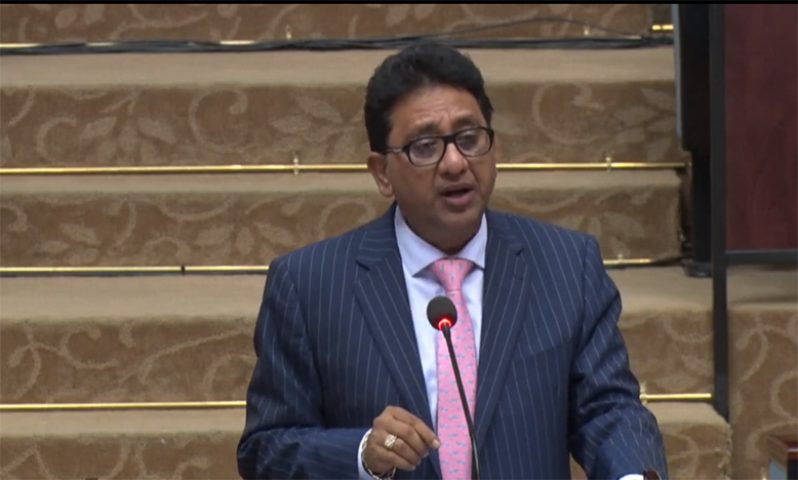– Farms soon for Regions 6, 10 to bring economic activity
– 22 tonnes of carbon dioxide removed with each acre
THE Industrial Hemp Bill 2022 was, on Monday, passed in the National Assembly which paves the way for the legal cultivation of hemp in Guyana with the first earmarked regions for cultivation being Regions Six (East Berbice-Corentyne) and 10 (Upper Demerara-Upper Berbice).
The bill was successfully passed during the 49th Sitting of the National Assembly of Twelfth Parliament in the absence of the Opposition, APNU+AFC, and clears a way for Guyana to venture into the economic benefits of hemp cultivation in the country.
Hemp or industrial hemp is widely known as a genus of the cannabis plant but is specifically grown for its industrial and or medicinal use. It consists of a lower tetrahydrocannabinol (THC) value as compared to marijuana.
During the final debate on the bill, Attorney General and Minister of Legal Affairs, Anil Nandlall S.C. said that with the exception of Belize, no other Caribbean Community (CARICOM) state boasts a designated Industrial Hemp Act.
According to the Attorney General, industrial hemp is a clean renewable resource that while planted produces a net negative in relation to carbon emissions.
Nandlall posited that industrial hemp also absorbs carbon dioxide and releases oxygen into the atmosphere with one acre of hemp being able to absorb over 22 tonnes of carbon dioxide.
“What is important is the cultivation of hemp and its value to the environment… Guyana as a country will strive to ensure that in almost each of its economic pursuits there will be an emphasis against the emission of noxious substance,” Nandlall said.
He mentioned this while noting Guyana’s push towards maintaining its low carbon status as outlined in the Low Carbon Development Strategy (LCDS) 2030.
To this end, he added that Guyana can continue to build its economic credentials which has already been established across the globe while moving into this emerging industry.
Nandlall told the House that the government has already identified at least two geographic regions of the country in which hemp will be cultivated in the initial stages. Those are Regions Six and 10.
These regions, he expressed, will benefit from employment and economic activities.
The Attorney General noted that his office has already received numerous correspondence from persons in Region 10 complaining that the Bill is not being passed swiftly.
This, he said, comes as many persons have already indicated their readiness to get involved in the cultivation of hemp in the region.
“Hemp is highly profitable; it is not susceptible to the vagaries of changing weather conditions as some of our traditional weather crops are, and is likely to yield far more profits than some of our traditional crops,” he stressed.
According to its explanatory memorandum, the Bill removes hemp’s classification under the Narcotic Drugs and Psychotropic Substance (Control) Act as a prohibited plant if it is possessed, cultivated or manufactured in accordance with the Act, once it is passed into law.
The Bill also provided for the administration of a regulatory framework as several clauses which provide for the establishment of the “Guyana Industrial Hemp Regulatory Authority” which will be a corporate body with a governing board.
In the prospective law, provisions are made for licensing activities with which persons can be issued licenses out of three types.
The cultivation licence authorises the holder to conduct all activities related to the cultivation of industrial hemp including possession, planting, harvesting, transporting, and distributing, among other things.
The manufacturing licence authorises activities related to the manufacturing of industrial hemp which includes the processing of raw hemp materials into extracted or isolated products or the processing and manufacturing of industrial hemp related products.
The third licence allows for persons to conduct research on industrial hemp.
In 2018, a report of the CARICOM Regional Commission on Marijuana in 2018 titled “Waiting to Exhale- Safeguarding our Future Through Responsible Socio-legal Policy on Marijuana” had noted that the value of hemp as an industrial and commercial substance is validated by scientific literature.
It is in this report that it was stated at that time that CARICOM laws made no provision for hemp, instead treating it in the same way as all forms of cannabis which prohibited the usage of hemp for any purpose. This included for important commercial uses.
Further, the regional commission called for hemp to be differentiated from other types of cannabis in the relevant legislation with the use of provision that define hemp according to minimal THC levels.
This move, the commission said at the time, would liberate hemp and encourage its use in important industry development.




.png)









